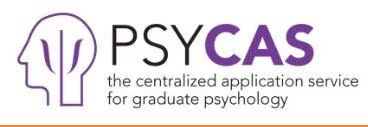PhD in Clinical Psychology Admissions
The PhD in Clinical Psychology program admits students once a year for the fall term, which starts in September. Applications for Fall opened in early September.
Admissions Requirements
- Applicants must hold a bachelor's degree from a regionally-accredited institution or the international equivalent.
- In addition to the required prerequisites, we strongly recommend applicants have related volunteer or work experience in the mental health field and experience with research.
- GRE scores are not required for admission to PAU doctoral degree programs.
Application Deadlines
Application Review Begins: November 1, 2025
Apply by January 7, 2026 for Regular Consideration
Applications may be accepted after this date if space is available.

Quick Application Checklist
- Online Application via PsyCAS
- Application Fee
- Official Transcripts
- Resume or Curriculum Vitae
- Three Letters of Recommendation
- Statement of Purpose

MS in Psychology & PhD in Clinical Psychology Open House
I would like to apply to the PhD and PsyD. Should I submit two personal statements?
Yes. Although both programs are committed to training clinical psychologists, the programs have different strengths, training missions, structure, and faculty. You do need to write separate statements of purpose for each program.
To apply to both programs:
1. Start an application for the PsyD program in PsyCAS
2. In the "Program Materials" section, select "yes" to the question that asks, "Would you also like to have your application considered for admission to PAU's PhD in Clinical Psychology program?"
3. In the "Optional Documents" section, upload your additional personal statement specific to the PhD program.
Frequently Asked Questions: PhD Admissions
Recommended GPA
+Applying to the Phd & PsyD Simultaneously
+You are welcome to apply to both the PhD and PsyD concurrently. Your applications will be reviewed separately by the two Admissions Committees, and the processes will generally run independently of each other. There is no penalty for applying to both programs – we do encourage you to be clear about how each program is a good fit for your academic and professional interests.
- You should submit two Statements of Purpose, which address the distinct reasons for applying to each.
- Start an application for the PsyD program in psychologyCAS
- In the "Program Materials" section, select "yes" to the question that asks, "Would you also like to have your application considered for admission to PAU's PhD in Clinical Psychology program?"
- In the "Optional Documents" section, upload your additional personal statement specific to the PhD program.
- PAU is atypical in terms of how students apply to research labs. Rather than applying directly to a research lab or faculty member, students apply to the PAU PhD program in general. Students can explore the broad range of labs available during the first year and even volunteer in labs. This allows students to make informed decisions about which labs they wish to apply to. Students apply for labs in the Spring of their first year.
- During the application process, we encourage students to mention a few faculty members with whom they would like to work. However, this is not binding.
Research & Clinical Experience
+- We strongly recommend applicants have related volunteer or work experience in the mental health field and experience with research.
- Feel free to include non-psychology research experience.
- For applicants with no formal research experience, including research conducted within an academic class may be helpful and may be a way to highlight one’s preparation for doctoral-level study.
- Feel free to include papers or projects underway but not complete at the time of application.
Prerequisite Courses
+The following courses are required for entry into the PhD Clinical Psychology program:
- Biopsychology
- Abnormal Psychology
- Statistics
The three mentioned courses will help ensure that all incoming students have a smooth transition into our rigorous doctoral program. They must be passed with a grade of B or better and completed before the start of classes in the PhD program. Prerequisite courses must be completed before an incoming student starts classes but do not need to be completed before applying. Students can mark that prerequisite courses are “in-progress.” Students with courses in progress or planned for a future term will be offered conditional admission, which will not be lifted until the pre-requisite courses are complete.
- These courses can be completed at either the lower or upper-division level and may be completed at a community college or university extension program to save money.
- Statistics can be completed in any discipline, not just in Psychology.
- There is no statute of limitations on when these courses must have been taken, but we do encourage students who have been out of school for some time to consider whether a refresher course might be helpful.
- Students with questions about whether a class will count toward a prerequisite should contact the Office of Admissions. An Admissions Counselor can review the course and determine its acceptability.
- Courses graded on a pass/no pass scale are acceptable.
Master's Degrees
+- Students are not required to have a master’s degree, and there is no preference given to students with master’s degrees. There is also no penalty for having a master’s degree.
- Grades from both the undergraduate and graduate levels are considered in the selection of students. Admissions Committee members do pay attention to trends in grades over time.
Personal Statement Criteria
+The purpose of the personal statement is to provide a sample of the applicant’s ability to write in an academic and professional manner, as well as to learn about any qualifications/life events that were not captured in the application.
Formatting:
- Double space, and limit to 1000 words
We recommend that you reflect on the following questions as you develop your essay:
- Why are you pursuing a PhD in clinical psychology? What led this interest?
- What are your research interests (including faculty you want to work with, and why)?
- What experience(s) do you have engaging with or providing services to individuals from minoritized and/or marginalized populations?
- What are your most important experiences and/or skills that will facilitate your success as a graduate student and future clinical psychologist?
You can also include (but not mandatory):
- How will a PhD from PAU help you to achieve your goals?
- What are your long-term professional goals?
In your essay, you may also wish to include reflections about the following:
- Experience with and/or commitment to serving minoritized and marginalized populations.
- Personal qualities that will facilitate success as a graduate student and future psychologist.
Areas of Emphasis
+- Students indicate their possible area(s) of emphasis on the PsyCAS application; however, this is not a binding choice.
- For the PhD, each area of emphasis is distinctive and has differing entry requirements.
Admissions Communication
+- The primary form of communication in the admissions process is email, and we will use the email address you list on your application.
- All students will receive a decision, and we will provide updates as often as possible.
- Offers of admissions are made in late March. You are always welcome to reach out to the Office of Admissions for an update about your application status.
- PhD and PsyD students have until April 15th to accept an offer of admission. This deadline may be extended due to extenuating circumstances.
Work Study
+- Work-study awards are part of the financial aid package. Once awarded work-study, students may apply for any work-study job on the PAU campus. While it is technically possible for students to use their work-study award at Stanford, it is rare.
- International students are generally allowed to work on campus but should check with the International Students Office to ensure an on-campus position is permitted based on visa type.
Transfer Credit
+
Graduate Level |
Only graduate-level courses are acceptable for transfer credit. A graduate-level course is any course for which a student received graduate credit at their previous institution(s). This may include graduate-level courses the student took as an undergraduate. |
Acceptable Grades |
A grade of “B” or better is required in a graduate-level course to be acceptable for transfer credit. |
Accreditation |
Previous graduate work must have been completed at a regionally accredited institution. International coursework must be in English in order to be evaluated for transfer. |
Time Limit for Requesting Transfer Credit |
Requests for transfer of units must be completed by the posted deadline. |
Maximum Units |
A maximum of 30 units may be transferred into the PhD program. If a student receives a waiver of courses beyond the transferable units, they must take elective units to meet the total unit requirement for graduation from PAU. |
Units Awarded |
Any course can only transfer in the number of transfer units equal to the comparable course at Palo Alto University, despite the number of units previously assigned to the course. The number of units of a course the student wishes to transfer must be equal to or greater than the units of the corresponding Palo Alto University course. Palo Alto University operates on quarter academic terms. Semester credits will be converted to quarter units for evaluation using a 1.5 quarter unit per 1.0-semester unit conversion. |
Course Obsolescence |
Courses must have been completed within five years prior to the time of matriculation at PAU. Students must provide a syllabus/syllabi for the course(s) they would like to transfer. Course descriptions are not acceptable. |
Syllabi |
Students must provide a syllabus/syllabi for the course(s) they would like to transfer. Course descriptions are not acceptable. |
Appeals and Exceptions |
Credit transfer decisions may be appealed in writing to the Curriculum Committee. |
Transferable Courses
-
PSYS800 History & Systems
-
PSYS801 Child & Adolescent Development
-
PSYS802 Cognitive Bases of Behavior I
-
PSYS804 Affective Bases of Behavior I
-
PSYS807 Adult Development & Aging
-
PSYS809 Psychopharmacology
-
PSYS811 Social & Personality Psychology
-
CLIN803 Psychodynamic Psychotherapy I
-
CLIN806 Cognitive-Behavioral Psychotherapy I
-
CLIN809 Child, Adolescent, & Family Psychotherapy
-
ASMT809 Intellectual Assessment
-
ASMT810 Psychometric Theory
-
ASMT815 Assessment of Personality
-
ASMT818 Psychopathology & Psychodiagnostics II: Child & Adolescent Disorders
-
ASMT819 Psychopathology & Psychodiagnostics II: Personality Disorders
-
ASMT826 Assessment of Psychopathology
-
STAT809 Research Methods & Statistics II
-
STAT810 Research Methods & Statistics III
Students may not receive transfer credit for any additional courses, including electives.

Office of Admissions
Palo Alto University’s Office of Admissions is eager to answer all your admissions questions and connect you with helpful resources as you embark on your application process.
Please direct all general inquiries to admissions@paloaltou.edu
| PhD Total Applicants | 342 |
| Admit Rate | 49.7% |
| Final Cohort Size | 75 |
Demographic Summary: Fall 2024 Deposited PhD Students
Self-Reported Race (PAU uses IPEDS rules when reporting race and ethnicity)
| Hispanic | 18.5% |
| American Indian | N/A |
| Asian | 19.6% |
| Black | 5.1% |
| Pacific Islander | 0.5% |
| White | 42.5% |
| Two or More Races | 5.6% |
| No Response | 8.2% |
Race - Narrative Summary
| Hispanic | 3 |
| Hispanic - White | 6 |
| Hispanic - Black - Pacific Islander | 1 |
| Hispanic - Black | 2 |
|
Asian Asian Indian Chinese Filipino Japanese Pakistani Sri Lankan Taiwanese |
17 7 5 1 1 1 1 1 |
| Black | 2 |
| White | 19 |
Gender
| Male | 16.4% |
| Female | 81.3% |
| Gender Non-Conforming | 2.3% |
| Not Listed | N/A |
Academics
| Average Cumulative Undergraduate GPA |
3.63 |
Other Demographics
| Average Age at Application | 30.27 (Range: 23-58) |
| US Citizenship |
86.9% |
| First Generation | 45.8% |
| Languages Spoken | English, Russian, Punjabi, Hindi, Mandarin, Chinese, German, Spanish, French, Farsi, Ukrainian, Hebrew, Turkish, Urdu, Arabic, Tagalog, Burmese, Cantonese, Italian, Gujarati, Haitian French Creole, Japanese, Kannada, Portuguese, Korean, Latin, Dutch, Armenian |

